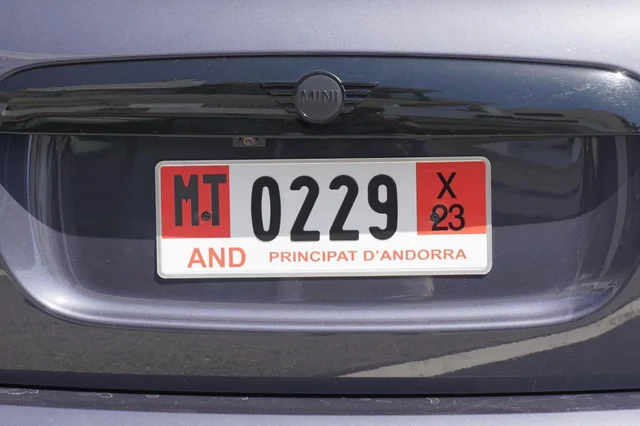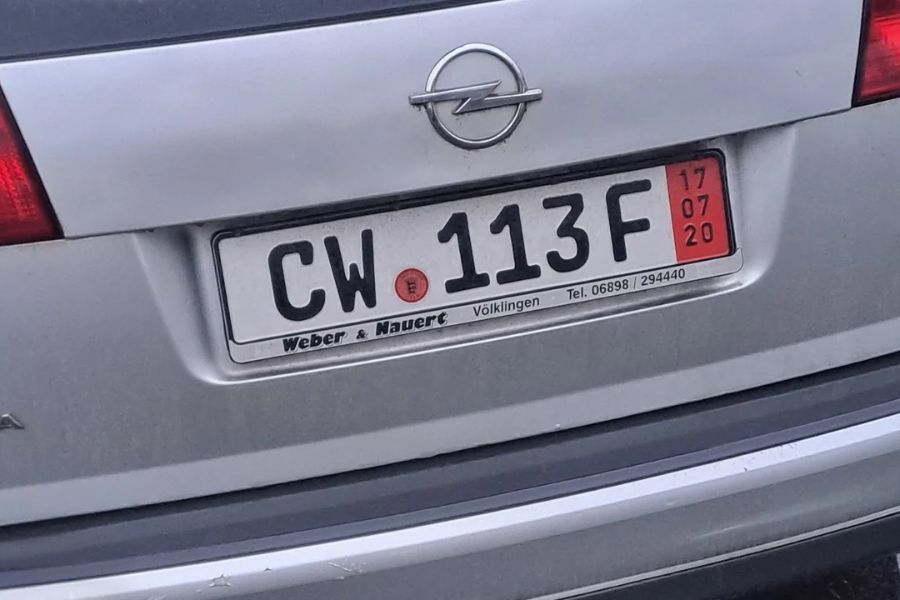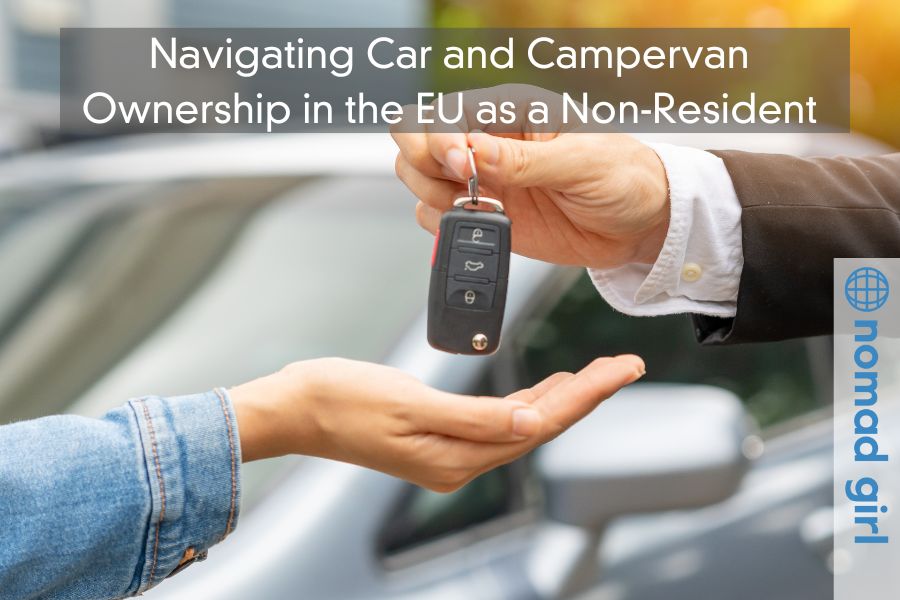For digital nomads, explorers, and campervan enthusiasts, the dream of traversing Europe’s scenic byways is a thrill that’s hard to resist. Rolling through centuries-old villages, vibrant cities, and breathtaking countryside offers an unparalleled sense of freedom.
But for those looking to own their own set of wheels in Europe, especially as a non-resident, it’s not as easy as signing on the dotted line. From paperwork tangles to residency quirks, buying and registering a car or campervan in the EU can feel like an adventure of its own.
Here’s our guide that maps out your options and offers insights into the challenges along the way.
Options for Buying and Registering as a Non-Resident
1. CarTurf – The Non-Resident’s Trusted Service
CarTurf has risen as a saviour for non-EU residents in Europe who are eager to own a car. This service, designed with travellers and digital nomads in mind, helps simplify the process by essentially acting as the vehicle’s legal guardian. CarTurf registers the car under their name but keeps ownership in your hands, which allows you to bypass the residency requirement that most countries enforce.
CarTurf also manages essential tasks like insurance, registration, and forwarding of any mail related to the vehicle. All you need to do is ensure a trip back to Germany every two years for the obligatory safety inspection, known as the TÜV. This is the ideal arrangement for many nomads, especially if their travels include Germany or nearby areas. Just be aware that you must keep those biennial inspections on your radar.
2. Andorran Tourist Plates – A Scenic Route to Registration
The Principality of Andorra, nestled between France and Spain, offers a unique option for non-EU residents: tourist plates, or the Matrícula Turística. Here, you register your vehicle in Andorra, where your home address appears on the registration. Andorra’s tourist plates (Matricula Turistica) allow you to explore the EU with a car technically registered outside of it.

If you are imparting the vehicle it must meet EU emission standards (Euro 5 or Euro 6), meaning a newer model is essential (usually 2013 or later). An Andorran vehicle inspection (ITV) will also be required, along with an export document (T2) to prove that the car is leaving the EU. This approach offers potential tax refunds like VAT, but you have to make sure you buy from an EU dealer that is allowed to deduct the VAT. You can also buy a car in Andorra and then any age car can be bought.
The tourist plates are valid for one year, but can be renewed in the country or remotely via a service.
It comes with some hoops to jump through, making it best suited to those planning to spend ample time in Andorra’s surrounding regions.
3. Registering Through a Company – Setting Up in France or Bulgaria
For those who want to get serious about their EU travels, establishing a company to register the car can be a solution — albeit an involved one. By setting up a business in France, Bulgaria or even Italy, non-residents can register the vehicle under their company’s name. This approach suits those planning extensive travel within the EU, with the added perk of company ownership.
But with greater flexibility comes greater costs. In France, the registration process demands a two-month stay and roughly €5,000, while in Bulgaria, it’s cheaper (around €800) but requires an annual visit for inspections. Registering through a company offers legal stability, but it’s a commitment that goes beyond the average vacation. For serious digital nomads or EU-bound business travellers, this can be an ideal, though pricey, solution.
4. Using a Friend or Relative’s Address – A Trust-Based Option
If you have a trusted friend or relative residing in the EU, you may be able to register your car using their address. It sounds straightforward, but there’s a big responsibility involved. Your friend or relative will act as the car’s official representative, handling taxes, mail, and the inevitable paperwork. This approach requires a solid level of trust and clear boundaries, as they will be on the line for any issues that arise with the vehicle.
For non-residents with a long-standing connection to an EU resident, this option is feasible, though it does come with risks. It’s important to weigh the practicality of this arrangement against any potential strains on personal relationships.
5. Export Plates – A Short-Term Solution
Export plates provide a temporary fix for those who want to drive a vehicle in Europe without establishing residency. Typically valid for up to 12 months, these plates allow you to register a car to your home country address without the need for a local residence permit. Export plates usually come with insurance, albeit limited to third-party coverage only.

German Export plates
Export plates make sense for those planning a shorter stint in Europe and can be a good option for travellers needing a vehicle for a few months. However, once the plates expire, you’ll either need to renew them or look for a more permanent registration solution.
Challenges of Buying and Registering as a Non-Resident
Schengen Zone Limitations – The 90-Day Dilemma
The Schengen Zone makes border-crossing a breeze, but for non-EU citizens, the 90-day rule can put the brakes on long-term travel plans. Non-residents can stay for only 90 days within any 180-day period, which complicates extended EU explorations. For those considering full-time van life across Europe, this time restriction poses a real challenge, often necessitating creative travel scheduling or visa applications to make it work.
You could go to countries outside Schengen, like Serbia, North Macedonia, Montenegro, Albania or Turkey. Make sure to familiarise yourself with how long you can stay there with a foreign car.
Bureaucracy and Paperwork – The Red Tape Reality
The administrative side of vehicle registration can be overwhelming, especially for non-residents. Each country has unique rules and processes, leading to extensive paperwork that can feel never-ending. From deciphering documents to running between departments, preparing for bureaucracy is crucial. Getting familiar with local regulations and being prepared for multiple visits to registration offices will make this process more manageable.
Language Barriers – Lost in Translation
Unless you’re fluent in the local language, tackling car registration forms and insurance policies can feel like deciphering ancient code. While many countries offer resources in English, others do not, making it necessary to seek help or even hire a local translator. Having a basic understanding of key terms will help, but for non-residents, language can be a steep barrier to vehicle ownership.
Potential for Scams – Buyer Beware
Buying a car in a foreign country often means navigating unfamiliar territory, where scammers can be on the lookout for unsuspecting buyers. Non-residents should exercise caution, especially when purchasing used vehicles. Research reputable dealerships, seek recommendations, and never rush into a deal. Being well-informed and vigilant can help you sidestep costly mistakes.
Insurance Complexities – Coverage for Non-Residents
Insurance coverage can be complex for non-residents, with policies that vary widely between providers. Some insurers may refuse coverage altogether, while others may offer only limited policies. It’s essential to review all options carefully and choose an insurer who understands your unique needs as a non-resident.
Important Considerations Before Buying and Registering
Travel Plans – Mapping Out Your Journey
Your travel plans should drive your decision when it comes to buying and registering a vehicle. If you’re set on a multi-country tour across Europe, you may benefit from export plates or services like CarTurf. Those planning an extended stay in a single country might consider forming a local company or even exploring residency options.
Budget – The Cost of Freedom
Owning a vehicle in the EU comes with costs beyond the purchase price. Registration fees, taxes, inspections, and insurance premiums all add up. Before committing, take a close look at each method’s financial implications and determine what best fits your budget. Choosing the right approach will help you avoid surprise expenses down the road.
Risk Tolerance – Choosing What Works for You
Different registration methods come with their own sets of risks. For some, the flexibility of using a friend’s address outweighs potential complications; for others, the stability of a company-owned car is worth the extra expense. Think about your risk tolerance and consider how each option aligns with your long-term goals.
Final Thoughts – Your Journey Awaits
Buying and registering a car or campervan in the EU as a non-resident is a process filled with opportunities and challenges alike. With careful planning and an understanding of your options, you can enjoy the freedom of the road without getting caught in a bureaucratic breakdown.
Whether you choose CarTurf’s smooth simplicity, Andorran tourist plates, or the stability of company ownership, a little preparation will pave the way for endless adventures across Europe’s stunning landscapes.


















